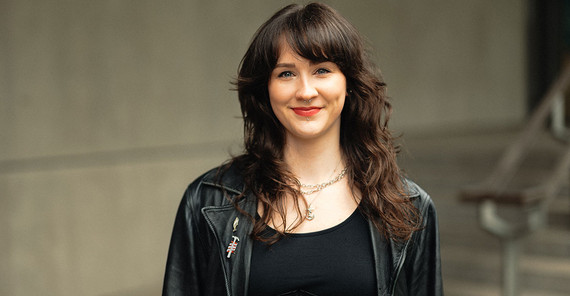Born in Dresden, she came to Potsdam in 2019 to study law. By then, she had already completed a Bachelor of Arts in Sociology. At the University of Potsdam, she became involved even beyond her studies, was a member of the Student Council, an advisor for gender and queer policies at the General Students’ Committee AStA, and a student assistant to Marcus Schladebach, Professor of Public Law, Media Law, and Air and Space Law. In the meantime, the 27-year-old has obtained a bachelor's degree in law with a focus on international law. Despite her hopes of going to Brussels soon, Triems enjoys living in Potsdam and appreciates the state of Brandenburg. “I'm from Eastern Germany!” says the young woman with piercings and a black leather jacket, and adds: “There is a progressive East German option for your vote.”
For Europe, the student would like to see diversity, social justice, and strong human rights. But environmental protection is also important to her. As a teenager, she became concerned with climate change and started “giving up meat, using less plastic, and buying fair-trade.” When she came to Potsdam to study, she wanted to do even more and decided to join Bündnis 90/Die Grünen. Since then, however, Viviane Triems has left the issue of environmental protection to her colleagues in the party and is mainly concerned with queer policies. In 2021, she was the spokesperson for women's, inter, trans, and gender policies for the Young Greens in Brandenburg. Today, she represents the Federal Working Group for Lesbian Policies and is the spokesperson for diversity policy on the Brandenburg state executive committee. “I really enjoy it. My job is to ensure that diversity is taken into consideration at every step of the way and is represented everywhere as a cross-cutting issue.”
Triems pursues an intersectional approach that aims to empower people who experience discrimination on several levels: for example, because they are Black, queer, and/or have a disability. “If we establish queer rights as human rights at the European level, they can no longer be disputed, even if a national parliament tilts to the right.” Triems is also queer. But the student emphasizes that she is not in politics just to benefit herself. “It is important to me that all people can lead a self-determined life.”
Her agenda also includes a fundamental right to housing, which does not yet exist. “Housing is extremely precarious not only in Germany, but throughout Europe.” Triems wants to ensure that private individuals can sue for their fundamental right to housing at the European Court of Human Rights. She hopes that this would increase the pressure on national parliaments and force politicians to act.
The Green Party urgently needs more young women, the student says. This is because the party follows the principle of parity, with half of the spots on the electoral lists going to female politicians. “So I very quickly took on a lot of responsibility, which was a challenge.” Her political commitment is on a voluntary basis – in addition to her studies, she currently also has a job as a research assistant in the Bundestag. However, her political work benefited her studies: She learned a lot about constitutional law. At the same time, she was able to put her international law focus into practice: “I already know from practical experience how European politics works.”
When Viviane Triems learned that Ska Keller from Brandenburg, who currently has a seat in the Green Group in the European Parliament, would not be standing as a candidate, she decided to follow in her footsteps. “We need another Brandenburger,” she thought. “And as I can really see myself as a full-time politician, I wanted to give it a try.” At the party’s national conference in November 2023, she ran for 20th place on the European list – and was elected.
“It’s probably just the first 15 to 18 places that are promising,” says Triems. So anything can happen for the Potsdam student. “But I'm really keen for it to work out.” If she is elected, she will travel directly to Brussels for the first parliamentary group meeting. This is where the President of the European Parliament is elected and the constituent sessions take place. “I like the idea of Europe: Although they are so different, all these countries are coming together to work with each other.”
Viviane Triems wants to encourage people to vote – for a democratic party. In the election campaign, her focus is on social media. “In recent months, I have noticed that the AfD (right-wing Alternative for Germany party) is mobilizing many young people on TikTok.” She wants to do something to counter this and makes educational videos about European legislation, but also dance videos with political claims. But Viviane Triems can also be more traditional: She also campaigns door to door or uses information booths. The social media campaign suits her better because it is not always easy to approach people. “Many people just want to stay in their bubble and I understand that. But it's important to me to talk to people in person.”
If Brussels does not work out this summer, Triems already has a plan B: She would like to complete a master's degree in International Law. She wants to stay in politics in any case. And the dream of being an MEP would not be off the table either – after the election is before the election, after all: “I'm simply drawn to Brussels.”


